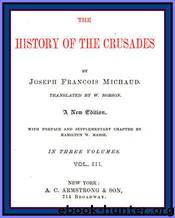The History of the Crusades (vol. 3 of 3) by Joseph Francois Michaud

Author:Joseph Francois Michaud [Michaud, Joseph Francois]
Language: eng
Format: epub
Published: 2015-06-07T16:00:00+00:00
As the influence of the clergy arose from Christianity, the nobles, in their manifesto, wished to claim the advantage of having alone converted the Gauls by their arms. All that they said in support of this assertion gave reason to predict that they would not triumph in a contest in which Victory would range herself on the side of knowledge and intelligence.
This was not an ordinary war, but a veritable war of opinions; and as the lords had, to sustain it, nothing but their swords, they were at last obliged to renounce their pretensions.
The society of Europe, however, arrived at that period so fatal to nations, at that crisis, almost always a sanguinary one, in which new opinions and old opinions declare an obstinate war against each other; in which all that is new ferments, and is agitated violently; in which all that is ancient resists, and falls to pieces with a crash. For a length of time old laws were powerless; and the laws which were endeavoured to be established, had, in their execution, neither the force that is acquired by habit, nor that which is conferred by experience. A universal crisis was experienced throughout Europe; and the West, troubled by revolutions and civil wars, was, for a moment, upon the point of falling back into the darkness and chaos of the tenth century.
It was at this period that was established in Germany the imperial chamber, instituted for the purpose of appeasing discords and repressing brigandage. In Arragon the tutelary authority of the justiza was created, who was armed against license with all the power of a dictator. In all countries brotherhoods and associations were formed against the excesses of anarchy. It was in France, above all, that the necessity was felt to call in justice to the support of shaken social order, and to place it under the safeguard of royalty. Royal power was born, in some sort, amongst the perils and fears of society. There is an instinct which, in moments of crisis, guides people towards the authority which is to protect them; and this authority becomes all-powerful, from the reason that its assistance is implored, and that it is the object of all hopes.
Ecclesiastical jurisdiction had already dealt a mortal blow to feudal justice. The study of the Roman law caused something of the experience of the ancients to revive among nations scarcely escaped from barbarism. A new judicial order sprang up in Europe, particularly in France.[116] This judicial order was at first very complicated, in consequence of that natural disposition of men of the pen and of the robe to multiply forms in all affairs. To follow the clue through the labyrinth of the new laws, the barons were deficient in knowledge, and more particularly in patience. If it be true that lawyers complicated legislation in order to remain the sole interpreters of it, their hopes were not deceived; for they in the end took the places of the feudal nobles in judicial functions.
It is
Download
This site does not store any files on its server. We only index and link to content provided by other sites. Please contact the content providers to delete copyright contents if any and email us, we'll remove relevant links or contents immediately.
| Buddhism | Christianity |
| Ethnic & Tribal | General |
| Hinduism | Islam |
| Judaism | New Age, Mythology & Occult |
| Religion, Politics & State |
Cecilia; Or, Memoirs of an Heiress — Volume 1 by Fanny Burney(31339)
Cecilia; Or, Memoirs of an Heiress — Volume 3 by Fanny Burney(30936)
Cecilia; Or, Memoirs of an Heiress — Volume 2 by Fanny Burney(30891)
The Secret History by Donna Tartt(16635)
Sapiens: A Brief History of Humankind by Yuval Noah Harari(13060)
Leonardo da Vinci by Walter Isaacson(11907)
The Radium Girls by Kate Moore(10910)
Sapiens by Yuval Noah Harari(4541)
The Wind in My Hair by Masih Alinejad(4426)
How Democracies Die by Steven Levitsky & Daniel Ziblatt(4401)
Homo Deus: A Brief History of Tomorrow by Yuval Noah Harari(4282)
Endurance: Shackleton's Incredible Voyage by Alfred Lansing(3845)
The Silk Roads by Peter Frankopan(3764)
Man's Search for Meaning by Viktor Frankl(3637)
Millionaire: The Philanderer, Gambler, and Duelist Who Invented Modern Finance by Janet Gleeson(3572)
The Rape of Nanking by Iris Chang(3518)
Hitler in Los Angeles by Steven J. Ross(3440)
The Motorcycle Diaries by Ernesto Che Guevara(3338)
Joan of Arc by Mary Gordon(3260)
